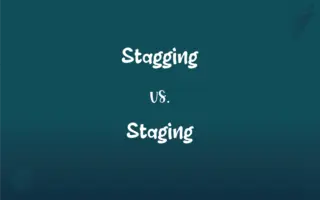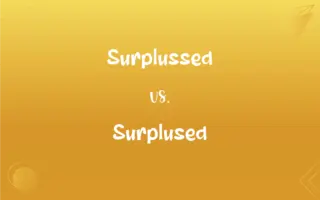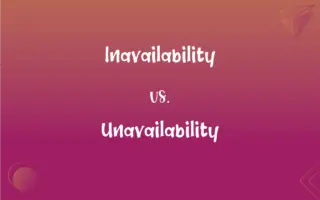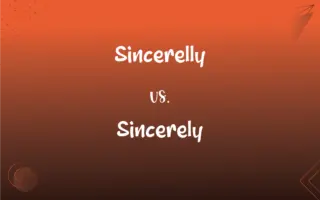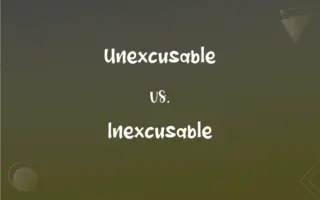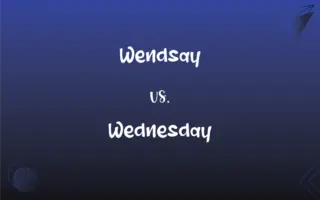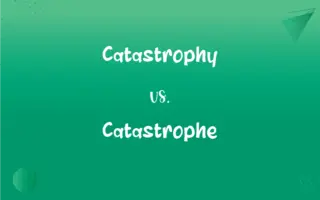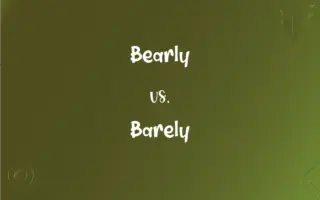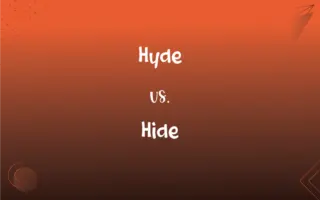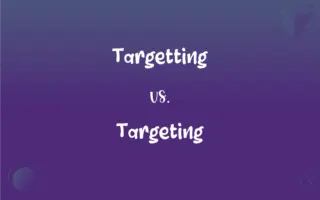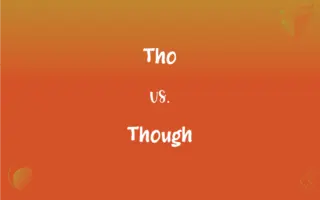Villian vs. Villain: Mastering the Correct Spelling
Edited by Aimie Carlson || By Harlon Moss || Updated on March 8, 2024
"Villian" is an incorrect spelling, while "Villain" is correct. A villain is a character in a story or film who does evil or criminal acts.

Which is correct: Villian or Villain
How to spell Villain?

Villian is Incorrect

Villain is Correct
ADVERTISEMENT
Key Differences
Think of "i" before "a" as in "villain," like the order in "criminal," a synonym.
"Villain" has "ain" at the end, similar to "pain," which a villain often causes.
Remember, "villain" has double "l" and "i" before "a," unlike "villian."
Recall that "villain" ends with "-ain," as in "mountain," a solid and correct ending.
Associate "villain" with "vile," as both start with "vil" and have a negative connotation.
ADVERTISEMENT
Correct usage of Villain
The child dressed up as his favorite villian for Halloween.
The child dressed up as his favorite villain for Halloween.
Every story needs a good hero and a convincing villian.
Every story needs a good hero and a convincing villain.
The villian in the novel had a complex background.
The villain in the novel had a complex background.
He plays the role of the villian in the play.
He plays the role of the villain in the play.
The movie's villian was defeated in the end.
The movie's villain was defeated in the end.
Villain Definitions
In a broader sense, it can denote any antagonist in a situation, not just in stories.
In the corporate rivalry, he emerged as the villain.
A person who is responsible for harm or mischief.
He played the role of the villain in their downfall.
Used metaphorically, it refers to a person who is seen as the cause of a particular problem.
In this crisis, he was unfairly labeled the villain.
A character in a story who is typically at odds with the hero; often engages in criminal or immoral activities.
The Joker is a classic villain in the Batman series.
In historical context, a villain was a feudal serf considered to have a low status.
In medieval times, a villain was bound to the land.
A wicked or evil person; a scoundrel.
A dramatic or fictional character who is typically at odds with the hero.
(also vĭlān′, vĭ-lān) Variant of villein.
Something said to be the cause of particular trouble or an evil
Poverty, the villain in the increase of crime.
(Obsolete) A peasant regarded as vile and brutish.
A vile, wicked person.
An extremely depraved person, or one capable or guilty of great crimes.
A deliberate scoundrel.
A low-born, abject person.
In fiction, a character who has the role of being bad, especially antagonizing the hero.
(poker) Any opponent player, especially a hypothetical player for example and didactic purposes. Compare: the current player.
Let's discuss how to play if you are the chip leader (that is, if you have more chips than all the villains).
Archaic form of villein
To debase; to degrade.
One who holds lands by a base, or servile, tenure, or in villenage; a feudal tenant of the lowest class, a bondman or servant.
If any of my ansectors was a tenant, and a servant, and held his lands as a villain to his lord, his posterity also must do so, though accidentally they become noble.
A baseborn or clownish person; a boor.
Pour the blood of the villain in one basin, and the blood of the gentleman in another, what difference shall there be proved?
A vile, wicked person; a man extremely depraved, and capable or guilty of great crimes; a deliberate scoundrel; a knave; a rascal; a scamp.
Like a villain with a smiling cheek.
Calm, thinking villains, whom no faith could fix.
Villainous.
A wicked or evil person; someone who does evil deliberately
The principle bad character in a film or work of fiction
Villain Sentences
The villain laughed menacingly as the hero approached.
She wrote a book with a very likable villain.
Every superhero needs a villain to fight against.
The villain in the story had a tragic past.
He didn't want to play the villain in the school play.
In many stories, the villain faces justice in the end.
In some tales, the villain turns out to be misunderstood.
The movie's villain was more interesting than the hero.
A good villain can make or break a story.
The villain had a distinctive laugh that chilled everyone.
A convincing villain is both smart and formidable.
In the end, the villain realized the error of his ways.
The story's villain was once a hero's closest friend.
The villain had a loyal army of followers.
Villain Idioms & Phrases
To paint someone as the villain
To portray someone as the antagonist or the bad guy in a situation.
The media was quick to paint him as the villain, without hearing his side of the story.
Every villain is the hero of their own story
Everyone believes they are in the right from their own perspective.
Despite his actions, the dictator thought of himself as a savior, proving that every villain is the hero of their own story.
A villain in disguise
Someone who appears to be good but is actually evil.
The charming gentleman was a villain in disguise, deceiving everyone around him.
A necessary villain
Someone who does unpleasant things for the greater good.
The strict teacher was seen as a necessary villain who maintained discipline.
Behind every villain is a tragic story
Suggests that negative behavior often has a root cause.
He seemed cruel, but behind every villain is a tragic story.
The villain of the piece
The main source of trouble or the antagonist in a situation.
In the corporate scandal, he was labeled the villain of the piece.
A two-faced villain
Someone who is deceitful and presents two different faces to the world.
The politician was a two-faced villain, promising reform while engaging in corruption.
Villain by necessity
A person forced into a negative role due to circumstances.
In a war-torn land, he became a villain by necessity to protect his family.
Live long enough to become the villain
The idea that over time, a hero or good person can become corrupt or turn into what they once fought against.
He fought against corruption, only to live long enough to become the villain.
FAQs
What is the root word of villain?
The root word of "villain" is the Old French word 'vilain.'
What is the verb form of villain?
There is no verb form of "villain"; it's exclusively a noun.
What is the plural form of villain?
The plural form is "villains."
What is the singular form of villain?
The singular form is "villain."
Why is it called villain?
Villain comes from the Old French word 'vilain,' initially meaning a farmhand.
What is the pronunciation of villain?
Villain is pronounced as /ˈvɪlən/.
Is villain a noun or adjective?
Villain is a noun.
What is another term for villain?
Another term for villain is "antagonist."
How is villain used in a sentence?
Example: "In the novel, the villain sabotaged the hero's plans."
Which vowel is used before villain?
Typically, the vowel 'a' is used before "villain" (as in "a villain").
Is villain an abstract noun?
No, it's a concrete noun representing a person or character.
Is villain a negative or positive word?
Villain is a negative word.
Which preposition is used with villain?
Prepositions like "of" or "in" are often used with "villain" (e.g., villain of the story).
What is the opposite of villain?
The opposite of villain is "hero."
Which conjunction is used with villain?
Conjunctions like "and" or "but" can be used with "villain."
Is the word villain is imperative?
No, "villain" is not used in the imperative form.
What part of speech is villain?
Villain is a noun.
What is the second form of villain?
There is no second form; "villain" doesn't change as it's a noun.
Is villain a vowel or consonant?
"Villain" is a word, not a vowel or consonant.
Is villain a countable noun?
Yes, villain is a countable noun.
How many syllables are in villain?
There are two syllables in "villain."
What is a stressed syllable in villain?
The first syllable 'vil' is stressed in "villain."
Which determiner is used with villain?
Determiners like "the," "a," or "this" can be used with "villain."
What is the third form of villain?
There is no third form; "villain" remains consistent as a noun.
Which article is used with villain?
Both "a" and "the" can be used as articles with "villain."
Is villain an adverb?
No, villain is not an adverb.
Is villain a collective noun?
No, it's not a collective noun.
Is the villain term a metaphor?
It can be used metaphorically.
How do we divide villain into syllables?
Villain is divided as 'vil-lain.'
What is the first form of villain?
The first form is "villain" (the base form).
About Author
Written by
Harlon MossHarlon is a seasoned quality moderator and accomplished content writer for Difference Wiki. An alumnus of the prestigious University of California, he earned his degree in Computer Science. Leveraging his academic background, Harlon brings a meticulous and informed perspective to his work, ensuring content accuracy and excellence.
Edited by
Aimie CarlsonAimie Carlson, holding a master's degree in English literature, is a fervent English language enthusiast. She lends her writing talents to Difference Wiki, a prominent website that specializes in comparisons, offering readers insightful analyses that both captivate and inform.


